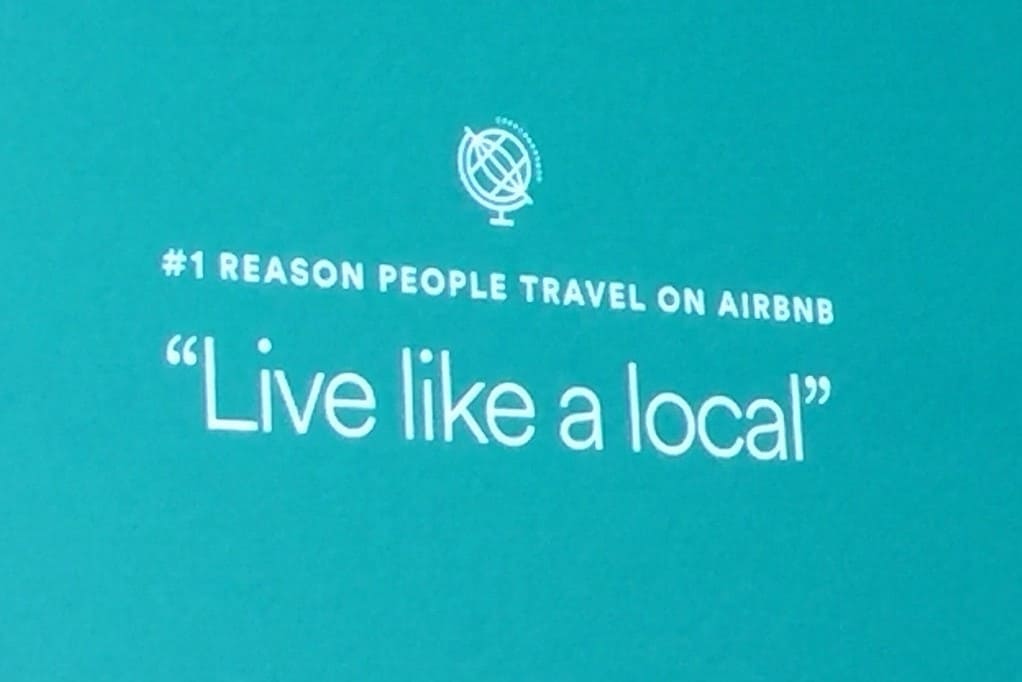Residents, authorities, hoteliers grapple with global sharing economy

Spain’s Balearic Islands has announced it will penalise landlords for illegally renting apartments to tourists with fines of up to 40,000 euros (~US$47,000). Renting apartments without a licence was banned in the Balearic Islands in 2012, however enforcement was lacking which is perhaps a big reason why rental prices in Palma de Mallorca have risen 40% since.
This tough new stance comes amid a popular backlash against mass tourism across Spain, including of course, Barcelona. Along with Venice, Italy, the Spanish city has probably attracted the most unwelcome attention from the world’s travel & tourism trade media for its over-tourism woes.
In isolated cases the backlash has become so violent that it presents a real physical threat to tourists. Last week, masked members of Arran ambushed a sightseeing bus in Barcelona, slashing its tyres and painting slogans on the windows. Windows of five-star hotels were broken and bicycles rented out to tourists were damaged. And in Palma, Mallorca, protestors let off smoke bombs and ran through restaurants before breaking windows. Arran apparently wants to bring about the “end of the capitalist system and global injustice” and believe that mass tourism is destroying cities and “condemning the working classes of the Catalan Countries to misery”.

Barcelona. By Ilkka Harmanen (CC BY 2.0) via Flickr.
In the UK, the Association of British Travel Agents (ABTA) has been very outspoken. Commenting on the attack in Barcelona, ABTA chair Noel Josephides told The Times: “These protests are a wake-up call. It is a great shame but we will see more of them. They are adopting dangerous tactics and that shouldn’t be happening. But the reason it is happening is because the local governments haven’t been listening or taking overcrowding seriously.”
And ABTA CEO Mark Tanzer, speaking about a phenomenon seen by many to be a major contributor to over-tourism — the sharing economy — told Radio 4 that the prevalence of websites like Airbnb meant governments could no longer easily regulate tourism numbers which had traditionally been controlled by hotel licences.
Let’s take a hop, skip, and jump through the media to see what’s been happening recently in other parts of the world. It is clear that some destinations are struggling more than others to adapt to the sharing economy.
Leveling the playing field in the Caribbean
Across the Atlantic from Europe, two Caribbean destinations are taking a proactive and pre-emptive approach to regulating the sharing economy. A valid concern of traditional accommodation providers (and taxi drivers in the case of ride-sharing) is that the products offered by regular people are not bound by the same licensing and taxation regulations.

Colourful Curaçao. By Nelo Hotsuma (CC BY 2.0) via Flickr.
That would be why the Curaçao Hospitality & Tourism Association (CHATA) advocates for “a level playing field” where all tourism industry stakeholders exercise their responsibility by adhering to laws and paying taxes. CHATA President & CEO Miles Mercera reckons this is the destination’s top priority as tourism should be a collective effort.
CHATA thinks the Caribbean nation could be collecting more than 10 million guilders (~US$ 5.6 million) annually by introducing and enforcing tighter regulations. These funds would contribute to air services and tourism marketing budgets, which are seen as lacking in the country.
Barbados Tourism Product Authority (BTPA) CEO Dr Kerry Hall has pointed out that traditional accommodation providers use sharing websites too: “There is a view Airbnb comprises solely of traditional residential homes offered by average Barbadians. In reality it is used by all types of tourist accommodation including villas, hotels, guest houses and condominiums, several of which are members of the Barbados Hotel and Tourism Association (BHTA).”
BTPA is surveying the industry, including share hosts, about proposed new regulations that are presumably intended to level the playing field. “The BTPA’s role is to create a happy medium between maintaining a high-quality product offering and ensuring Barbados has an inclusive tourism industry where average Barbadians can benefit from this dynamic sector,” Hall said.
Sources: Curacao Chronicle; Loop.
Prevention is better than cure in Mexico

Downtown Mexico City. By Alejandro Islas Photograph AC (CC BY 2.0 ) via Wikimedia.
To the northwest of the Caribbean, in Mexico City, Airbnb has pre-empted problems by agreeing with the local government to collect and remit a 3% occupancy tax, which is the same as what hotels pay.
The occupancy tax is a first for Airbnb. It is an experiment to ward off legal problems it has faced in cities such as New York and Barcelona by giving the authorities and hoteliers what they want: regulation and a level playing field. It is studying whether it can replicate it in other cities
“We want to strike the right balance between the governments and our users,” Nathan Blecharczyk, Airbnb’s co-founder and chief strategy officer said. “If there are concerns, we can work together.”
Mexico City Hotel Association director Alberto Albarran agreed that the measure was “positive” but that it doesn’t go far enough. “We still have to pay licenses, permits, social security, income taxes, have fire alarms, seismic alarms and payroll, just to name a few,” he said. “There are still many challenges.”
In response, Mr Blecharczyk said: “There will always be a powerful lobbying group wanting more.”
Source: The National.
Info wars in the United States
To Mexico’s north, in the US, Airbnb has recently settled long-standing disputes in two of the company’s most lucrative markets. In San Francisco, Airbnb has agreed to require that hosts register their rental properties with the city. In New York, the company has agreed to permit its hosts to rent only one unit at a time, although that hasn’t stopped a local hotel association releasing a controversial YouTube video suggesting that Airbnb properties posed a public security threat …
And issues between Airbnb, authorities, and hoteliers continue to simmer in Los Angeles and probably a lot of other cities.
In Santa Monica, Scott Shatford was the first person to be convicted for snapping up long-term leases in desirable locations and then sub-letting them via sharing platforms. He now scrapes data from Airbnb to provide investment information to those looking to purchase or lease properties specifically for the short-term housing market.
Another outfit scrapes data from Airbnb but uses it against the sharing platform. Insideairbnb.com rose to prominence after Murray Cox and Tom Slee discovered that Airbnb had allegedly wiped more than a thousand New York listings just days before claiming their site was used for home sharing by ethnically diverse lower middle class and working class professionals in the Big Apple. Cox and Slee have continued to use data to argue that Airbnb has contributed significantly to the housing crisis, exacerbated gentrification, and used the feel-good stories of genuine home sharers as a front.
Source: The Guardian.
Debate rages in Canada
Further north again, in Canada, a study by Montreal’s McGill University concludes that only a small number of commercial property managers generate the majority of Airbnb’s overall revenue. And this is absorbing available housing stock and driving up rents in Canada’s three biggest cities.

Montreal skyline from Mt Royal. By Taxiarchos228 (CC BY 3.0) via Wikimedia.
Only 10% of hosts account for the majority of the revenue and nights booked on Airbnb in Toronto, Vancouver and Montreal, according to David Wachsmuth, a McGill professor of urban planning and lead author of Short-term Cities: Airbnb’s Impact on Canadian Housing Markets. He told CBC Montreal: “What we’re seeing with short-term rentals is that the right of property owners to make money is trampling on the right of people to afford houses,” Wachsmuth said.
Airbnb has disputed Wachsmuth’s findings with an attack on his professionalism: “The author of this study has a history of manipulating scraped data to misrepresent Airbnb hosts, the vast majority of whom are middle-class Canadian families sharing their homes to earn a bit of additional income to help pay the bills.”
In December 2015, the Quebec provincial government passed Bill 67 to regulate short-term rentals. People who regularly rent properties need to get a certificate from the Quebec’s tourism ministry, pay a lodging tax, and advise landlords that they will be renting to tourists.
Wachsmuth doesn’t think that’s enough. He proposes three regulations:
- Hosts should only be allowed to rent their primary residences.
- No properties should be available for short-term rentals all year round. (Amsterdam caps rentals at 60 days of the year; London 90 days.)
- Sharing platforms should be required to enforce the regulations.
Source: CBC.
A backlash is building in Japan

Shinjuku skyscrapers and Mount Fuji. By Morio (CC-BY-SA‑3.0) via Wikimedia.
Across the Pacific, in Japan, a backlash is building. There are growing numbers of complaints from neighbourhood groups regarding security and noise and littering from tourists staying in short-term rentals.
In theory, rooms can only be used for short-term lets if the owner has a hospitality license. To let rooms commercially, the property has to be in a commercial district, have a supervisor present 24/7, and, if it is in an apartment block, the landlord must have the consent of other households. In practice, however, many room sharers continue to let private rooms regardless.
New legislation passed in June is meant to legalise home sharing and encourage homeowners to register their activity. The law is set to come into force in 2018, but regulating the sector is a work in progress and the finer details have been left to local governments.
Source: Nikkei Asian Review.
Stop weeping & moaning
To tourism and hospitality stakeholders who would rather see the back of accommodation sharing platforms, the world’s top tourism boss might say “stop weeping and moaning”.
In April, UNWTO secretary-general Taleb Rifai, reportedly said: “[The industry] should recognise that [sharing accommodation] is not going to go away, so instead of weeping and moaning and yawning and saying ‘no, no, no, we don’t want it’, it must find ways of coming to terms with this phenomenon and make it work for their advantage.
“The so-called sharing economy has shaken our industry to its roots,” Rifai added. “I believe that our sector is too conventional, too conservative. It is not able to either embrace or know how to deal with the disruptive forces of technology, the positive disruptive forces of technology […] Anyone who looks at this activity as taking away from others, they are mistaken. It is bringing in new waves of travellers that have not been seen before. You need to come to terms with it, you can’t just fight it.”
Source: The Telegraph.
Featured image: At the Airbnb launch of “Live There”, April 2016. By Kevin Krejci (CC BY 2.0) via Flickr.
Related posts





